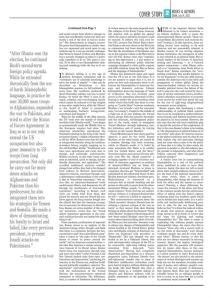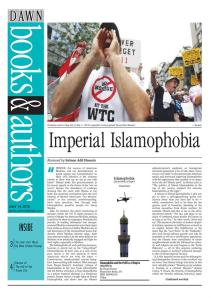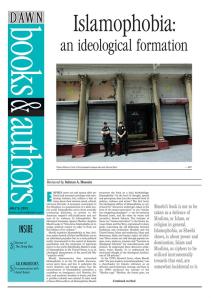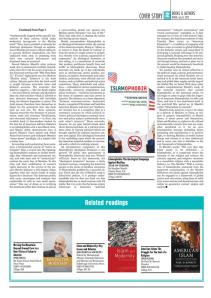[Here is the link (PDF) to my review of Irfan Husain’s Fatal Faultlines: Pakistan, Islam and the West for The Sunday Guardian. A special thanks to the wise Panda for his essay “Taking the Place of Martyrs: Afghans and Arabs Under the Banner of Islam” which led me to Sayres S. Rudy’s “Pros and Cons: Americanism against Islamism in the ‘War on Terror.'” Rudy’s essay helped me in making sense of Husain’s seemingly self-contradictory and confused text, and convinced me that it should not be dismissed as muddled thinking. Most importantly, it helped me locate Husain within the discourse of the WoT and American imperialism for which he provides apologia in supple prose. Below is the chicken-scratch version of the published review, with my notes and/or lines that I didn’t pursue in print.]
+++
…the WoT discourse bears a rigorous logic immune to simplistic “political,” “contextual,” or “anti-racist” antidotes. Its explicit core concept is grievance, its core empirical focus is the trajectory of grievance, and its core causal inference is the humiliation or indignity of the grievance. The argument above is, crucially, indifferent to the grievance’s substance. The partial silencing of political grievances in favor of voicing cultural or economic grievances matters but is secondary to the ideological function of the grievance format. As it happens, moving from the Arab or Muslim “mind” to economic, cultural, or political “root causes” of violence has not removed but re-situated and reinforced Islam’s unique anti-modernism. Crude racism indicts the racist but even the compassionate or media-savvy consumers see 9/11 or suicide-bombing as an overreaction to grievance, in which Muslims react unlike other aggrieved people. “Why not march peacefully, produce a Gandhi or Mandela, form civil society, use micro-credit for grassroots mobilization?” The answer is deduced: Islam’s disposition. If racist, this inference represents the new racism of the “war on terror.” It is racism derived from a logical, empirical proof rooted in the humane sensitivity to suffering and pitched explicitly against the spitting hatred and contempt for an inferior other. The proof is flawed but its rational-induction marks the new derived racist logic of the WoT — call it the anti-racist racism of grievance-talk.
…
The broad pro-war sentiment, I believe, accepts each of these interlocked components of the official policy. I wish to summarize the discourse before going into detail: As we have seen, some unique quality of Islam seems, empirically, to cause or permit an extremist minority of Muslims to overreact to common grievances with homicidal violence. We ought to oppose those grievances —mainly domestic political and economic deprivation — but the anti-American terrorists they have spawned are irremediable Enemy Muslims. With our Friend Muslims we must defeat Islamist terrorism in a “long war.” This indefinite conflict pits America’s universalist “culture of life” [Good America] against Islamism’s insular nihilism [Bad Islam(ism)].
I need to clarify here that the WoT and its discourse are racist toward Islam intrinsically, and not only toward Islamists, pace official ceremonies and disclaimers, and not only as a by-product of biopolitical sovereignty. Indeed, the trajectory of the war discourse is enormously significant; it is how the argument for the endless war, permanent state of exception, and all attendant civil, social, and human rights violations and atrocities proceeds that matters— especially: how Islamism is (1) separated from Islam; (2) opposed to the U.S.-Islam alliance; (3) re-identified with Islam; and (4) recoded as Islam’s ineluctable anti-U.S. enemy. The logic of the argument refolds Islamism and anti-U.S. terrorism into Islam in the end, on grounds that even as a tiny, breakaway “exception to the rule,” Islamic militarism is endemic to Islam.
Sayres S. Rudy, “Pros and Cons: Americanism against Islamism in the ‘War on Terror.'”
Immediately after 9/11, ex-diplomat and Pakistani columnist, Irfan Husain was flooded with emails from Americans wanting to understand “where the suicide bombers had come from.” In Fatal Faultlines: Pakistan, Islam and the West Husain sets out to answer their question, “Why us?” To do so, Husain “was forced to confront the prejudices and atavistic desire for vengeance that millions of Muslims harbour.” (p5) Americans are too focused on local issues, he tells us, to know the forces of history that came crashing into the Twin Towers. Faultlines is premised on an essential difference between Westerners and Muslims. (West and Judeo-Christian West — and when speaking of the West in history, Christendom — are used fairly interchangeably.) Since “the ongoing confrontation between Islam and Christiandom began long before either faith was born,” and “bin Laden and his ilk are driven at least partially by events that happened a millennium or more ago,” Husain explores the “historical and religious factors that separate the Muslim world from the West – especially America.”
A narrative of human progressundergirds Faultlines with the US, the leader of the West, its vanguard. Muslims are the backward other of progress: “[W]e tend to forget what Christendom was like when it was the same age as Islam is today. Imagine, for a moment, that it is the year 1400 in Europe. This would be the Dark Ages, before the Reformation, and well before the Enlightenment.” (p226) … ”Obviously the rest of the world isn’t going to wait for centuries for Muslims to catch up and enter the 21st century.” This Muslim lagis the essential divide, a fatal fault-line between Islam and the West, which Husain brings into being with his historical narrative of a millennium-long conflict between Islam and Christendom. The US is now heir to this history: “the leadership of the Western, Judeo-Christian world has passed on to America; with this mantle goes the poisoned chalice.” Continue reading →





 “Islamophobia is a gloss for the anti-Muslim racism that collapses numerous groups in the single category ‘Muslim,’” (p30) writes Junaid Rana in his
“Islamophobia is a gloss for the anti-Muslim racism that collapses numerous groups in the single category ‘Muslim,’” (p30) writes Junaid Rana in his 






comments